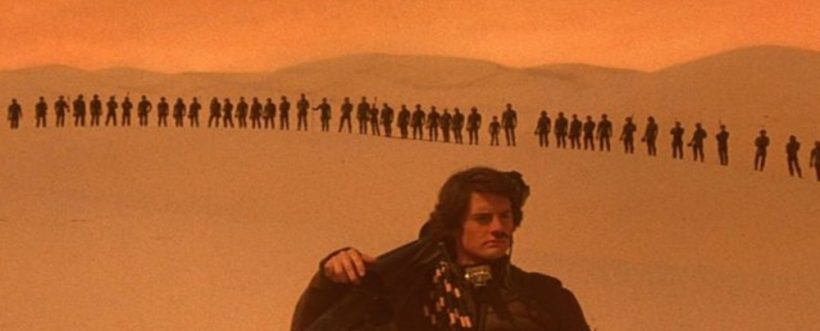This is the first in a series of book reviews on works of literature that are worthy of some time, words and discussion. There are some books that resonate strongly, stick in the memory, make you laugh out loud, or entertain and enthrall. This doesn’t happen with every single book I read, but when it does I will write about it.

Review Number: 1
Review Date: 28 May 2012
Title: Dune
Author: Frank Herbert
Country: United States
Publication Date: 1965
Genre: Science Fiction
Let’s face it – science fiction gets a bad press. A lot of people imagine it’s just spaceships, lasers and worlds populated with two-dimensional characters dressed in tin foil.
But with Dune Frank Herbert has constructed a convincing setting which is satisfying, detailed and byzantine in its scope. He showed remarkable prescience with his ecological themes of recycling and water conservation, and his sympathetic and fascinating treatment of an Arabic-style culture is unusual even today.
The story’s protagonists are the dukes, barons, assassins and truthsayers. Their daily lives comprise danger, deception, betrayal and power. Nothing humdrum stops the flow – this is grandeur on the greatest scale. Some people regard this novel as one of the finest science fiction books ever, and I would agree.
It’s set in a far flung future, possibly 20,000 years on from our own Earth. But in a clever supposition Herbert has envisaged that technology has not advanced relentlessly. His novel hints at the Butlerian Jihad – where humankind rebelled against the rise of the machines. Or the Mentats – people who have developed their talents and intellect to the level of a computer.
While some books tend to do a massive infodump on the poor reader, Herbert eschews such simplicity or vulgarity. Slowly and subtly the context is introduced – the Orange Catholic Bible or the Zensunni reveal elements of religious unity. The Bene Gesserit – the all-female providers of truth and future paths. The Guild – controllers of space travel. He leaves the reader wanting more – which is the hallmark of a great writer.
The action begins on Caladan, home of House Atreides, and Paul (the Duke’s son and main focus throughout) is preparing for a move to the new world of Arrakis. Or Dune, desert planet, where not one drop of rain falls. We can identify with this change and that’s why the book works. The epic nature of the theme doesn’t overshadow the central characters. They are still human with emotions and feelings we recognise.
Once on Arrakis, House Atreides must deal with the threats of the Emperor – who gave them Dune and views them as dangerous. And from House Harkonnen – the Atreides’ arch-enemies and former occupants of the desert planet.
But the true power may lie in the Fremen – the planet’s inhabitants. Their eyes pure blue from spice addiction. It is this spice “melange” that comes from the huge sandworms. Spice can only be found on one planet in the known universe – Dune. And with spice people can see the future or fold space – travel without moving. Add to this heady mix of intrigue is the Bene Gesserit’s and Fremen’s belief in the Kwisatz Haderach – a male messiah or superbeing.
(It’s been said by some that melange can be a metaphor for oil. The Guild is OPEC, while the warring factions for Arrakis are our governments and opponents. The Fremen – maybe the revolutionaries. The name of Arrakis … Arrak … Iraq.)
I’ll say no more about the plot as to reveal too much would ruin the enjoyment of an epic. Dune is the first of a sequence of six, but it can be read as a standalone. Herbert’s son also co-wrote some more books in the Dune universe – but I read one and would certainly not try another.
The popularity of Dune is evident – with a David Lynch film (which I liked), mini-series, board game, computer game and references in popular culture. But none of these can ever match the entertainment value of simply reading the book and appreciating a masterpiece.


Those wishing to dig further into Dune may be interested in FRANK HERBERT: THE WORKS, a comprehensive critical biography of the complete oeuvre of Frank Herbert. A free excerpt is available at Amazon and Barnes & Noble.
https://www.facebook.com/FrankHerbertTheWorks
Looks like a very interesting book and you’ve had a good response judging from the likes on Facebook. Good luck with that!
I think I might buy it as I’m currently reading the series again. Finished Children of Dune a few weeks ago and now having a break by reading some Graham Greene and history.